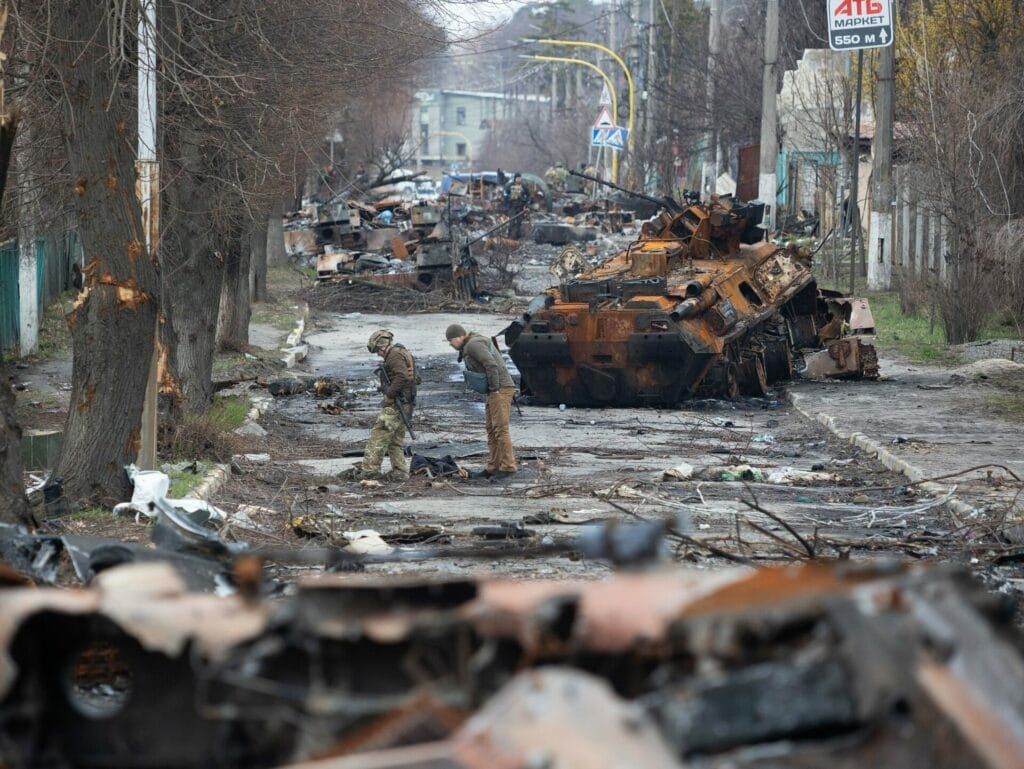Ending the war while ensuring Russia does not gain territory via nuclear coercion
By Robert J. Goldston | January 4, 2023
 Bucha main street after Russian invasion of Ukraine. Photo: Oleksandr Ratushniak Wikimedia Commons / CC-BY-SA
Bucha main street after Russian invasion of Ukraine. Photo: Oleksandr Ratushniak Wikimedia Commons / CC-BY-SA
There is a wide-ranging debate about what NATO’s goal should be in Ukraine, from immediate cease-fire at the present line of contact to full return of occupied Ukrainian territory, including all of the Donbas and Crimea. This wide range of views arises from the uncertain balance between concern, on the one hand, that one country should not be permitted to seize territory from another by force and, on the other, concern about the catastrophic consequences of triggering a nuclear war.
Neither NATO’s mandate nor its resources permit it to prevent all inter-state military aggression. However, as a nuclear-armed alliance it has specific interest in resisting, by conventional means, nuclear-backed conventional military aggression. This is because the demonstration of the lack of utility of nuclear weapons as a shield for conventional territorial aggression would be of great stabilizing and nonproliferation value for NATO and for the world. It would reduce the temptation of nuclear-armed states to seize nearby territory by force and also reduce the impetus for non-nuclear-armed states to acquire nuclear weapons for self-defense. Furthermore, it would make a future NATO policy of “no first use” of nuclear weapons much more palatable to our allies.
Let us posit, then, that NATO should define its overarching strategic objective in Ukraine to be that “Russia should not gain territory through nuclear coercion.”
At the outset of Russia’s February 2022 invasion of Ukraine, President Vladimir Putin put his nuclear forces on a “special regime of combat duty,” and in his speeches of September 21 and September 30, 2022, he threatened to use nuclear weapons to achieve his territorial objectives. Therefore, the strategic objective posited here clearly implies that NATO should back Ukraine in regaining territory occupied by Russian forces since its 2022 invasion. In 2015, Putin indicated that he had been ready to put Russian nuclear forces on alert during the crisis over its 2014 annexation of Crimea. Thus, while the strategic goal defined here indicates that NATO should prioritize aiding Ukraine in regaining territory lost since February 2022, it also provides justification for aiding Ukraine to return fully to its internationally recognized borders. This flexibility is consistent with NATO’s policy of “Nothing about Ukraine without Ukraine.”
The statements by the Biden administration about the “catastrophic” consequences for Russia of nuclear use seem to have been effective in causing the Kremlin to moderate its threats of late. Realistically, the use of one or a few battlefield nuclear weapons would have little military utility. The scale of nuclear weapon use needed to be militarily significant, by contrast, is large, resulting not only in immense destruction but also widespread nuclear contamination. If Russia were to commit the horrific atrocity of attacking Ukrainian cities with nuclear weapons, full international isolation would be certain and President Biden’s statement about the risk of Armageddon would be particularly apt. Thus, Russia is strongly deterred from using nuclear weapons at any scale—but this does not mean that the risk can be neglected. The near and longer-term risks of nuclear war should motivate NATO to provide President Putin with a means to vacate Ukrainian territory without disgrace, while strengthening strategic stability in Europe.
If NATO achieves the overarching strategic objective posited here—demonstrating the uselessness of a nuclear arsenal as cover for military aggression—this will be a valuable lesson for all nations. To provide an incentive for Putin to accept such an outcome, the United States and NATO should offer to negotiate with Russia on a set of strategic stability arrangements that addresses the concerns implicit in the proposals by Russia to the United States and NATO before the invasion. These arrangements, however, should benefit NATO as well as Russia. Indeed, the Biden administration is attempting to re-open such discussions. Elements of such arrangements could include:
- A renewed Conventional Forces in Europe (CFE) agreement that limits conventional forces and pulls them back from borders. This could include a renewal of the Open Skies agreement that allows overflight for verification.
- A renewed Intermediate-range Nuclear Forces (INF) agreement in Europe, in this case excluding all sub-strategic nuclear weapons from Iceland to the Urals.
- A renewed Anti-Ballistic Missile (ABM) agreement with verifiable limits to numbers of launchers and their capabilities.
- An extended Strategic Arms Reduction (New START+) agreement, reducing the number of deployed warheads by eliminating all silo-based ICBMs, due to their threat to strategic stability.
- An agreement among the five permanent members of the UN Security Council on the consideration of nuclear use only in case of “imminent existential threat,” as a step toward an agreement to abide by a policy of “no first use” of nuclear weapons—and their eventual abolition.
In sum, NATO should adopt an overarching strategic objective in Ukraine that Russia should not gain territory through nuclear coercion. The Biden administration’s clarity about the consequences of nuclear weapon use have been effective, but the risk remains. Therefore, the United States and NATO should offer Moscow win-win steps towards strategic stability in Europe. These steps would be beneficial to the West, address concerns Putin raised in the months before the invasion of Ukraine, and make it politically feasible for Putin to withdraw Russian forces from Ukrainian territory, providing for a more stable Europe, and world, in the future.
Together, we make the world safer.
The Bulletin elevates expert voices above the noise. But as an independent nonprofit organization, our operations depend on the support of readers like you. Help us continue to deliver quality journalism that holds leaders accountable. Your support of our work at any level is important. In return, we promise our coverage will be understandable, influential, vigilant, solution-oriented, and fair-minded. Together we can make a difference.
Keywords: NATO, Russia, Ukraine, nuclear coercion, strategic stability negotiations
Topics: Nuclear Risk
















How about agreeing to remove all US nuclear weapons from five NATO countries–Italy, Germany, Netherlands, Belgium, Turkey–and removing new missile bases in Romania and Poland in violation of the 1972 ABM Treaty with Russia, which Bush walked out of and restoring the INF Treaty and then inviting Russia to sign the new Treaty for the Prohibition of Nuclear Weapons together with the US and negotiate for the total elimination of nuclear weapons with the other 7 nuclear weapons states? That would be a sincere proposal for peace and honoring our NPT Article VI promise in good faith to eliminate nuclear… Read more »
Because, Alice Slater, Russia currently cannot be trusted. Putin has made it clear that he is on a mission of conquest, that he intends to annihilate Ukraine as a culture, a people, and a nation and make it more of Russia. Until the problem of conquest by war is resolved, there is no possibility of unilaterally reducing nuclear weapons. Indeed, if Putin should somehow win, every nation on earth will know that nuclear nations can conquer non-nuclear nations without fail. This means that every non-nuclear nation will scramble to become nuclear-capable merely to survive. They would be foolish not to.… Read more »
You never know until you try! Putin has put many offers on the table for nuclear disarmament that the US has rejected including treaties to negotiate bans on weapons in space and cyberwar, reinstating the ABM and INF Treaty, Cutting our arsenals to 1,000 each and calling the other parties to the table to negotiate for nuclear disarmament. Where have you been when all this was happening?
I hate to be the guy who says, “You’re both right,” but here I am. 1) NATO must not allow Russia to gain territory through nuclear coercion for all the reasons that Jennifer Reitz states, and also the reason that this will make a “No First Use” stance more tenable with our allies, and 2) The loss of the ABM treaty (100% our fault) and the loss of the INF treaty (shared blame) are disastrous for nuclear stability in Europe. The things that Alice Slater suggests are either in the proposal here, or could build on them. So you are… Read more »
Who gives NATO the power? Its an old Cold War alliance that was designed to stop the now vanished Soviet Union. We’re actually now expanding it to confront China as well as Russia despite promises to Gorbachev when he let all of Eastern Europe go free that we would not expand it east of Germany! We have a treaty with the UN never to use aggressive power without Security Council approval unless we’re under imminent threat of attack. Clinton broke this deal when he bombed Kosovo over the Security Council veto by Russia who was supporting the other side and… Read more »
> An agreement among the five permanent members of the UN Security Council on the consideration of nuclear use only in case of “imminent existential threat,”
Existential? Are the Falklands Islands and Gibraltar existential for the UK? Is Guam existential for the USA? Is Crimea existential for Russia? Is Taiwan existential for the People’s Republic of China? If some and not others, what do the others need to say or pretend to believe to be allowed?